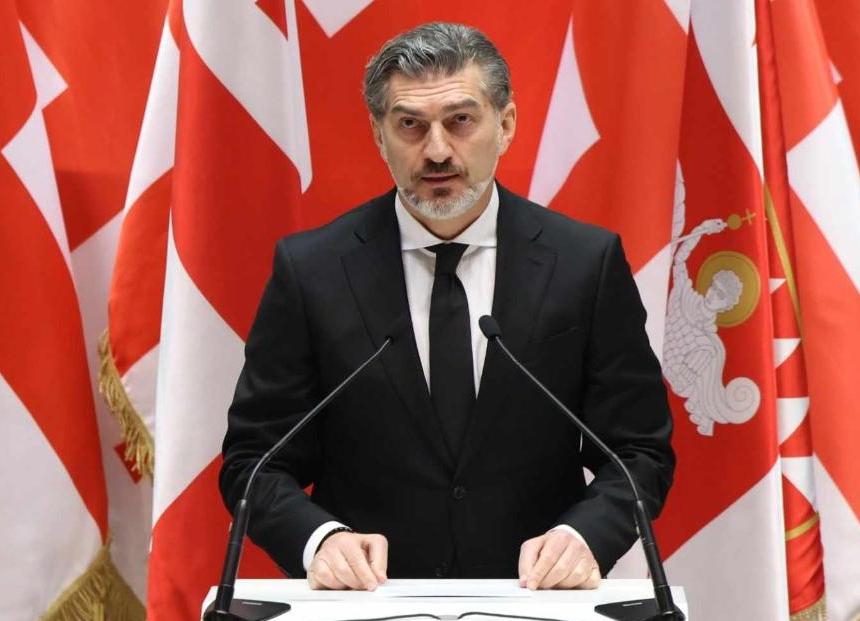
On December 29, 2024, Georgia's newly elected president, Mikheil Kavelashvili, officially took the oath of office. However, despite his overwhelming support in the parliamentary election, the political storm in Georgia has not been quelled. Kavelashvili's inauguration coincided with the outgoing president, Salome Zurabishvili, refusing to leave office and challenging the election results, highlighting the deepening political crisis in the country. This turmoil not only threatens Georgia’s domestic stability but also has far-reaching implications on the international stage, particularly in relation to its ties with Western nations, leaving Georgia’s future uncertain.
During his inauguration, Kavelashvili promised to be "the president of everyone" and stated that his goal was to "strengthen and unite society." He acknowledged the current political divisions and polarization in Georgia. However, Kavelashvili's political background and deep ties with the ruling "Georgian Dream" party make him a symbol of "pro-Russian" sentiment in the eyes of the opposition. He has been associated with the controversial "foreign agent law" and has openly accused Western countries of fueling Georgia's confrontation with Russia.
Although Kavelashvili has some popular support, the political situation in Georgia has become increasingly tense as he assumed office. The conflict between the opposition and pro-European factions has escalated, especially amid Western criticism of Georgia’s internal affairs. Whether Kavelashvili can achieve his goal of "uniting society" remains uncertain.
Zurabishvili, the former president and a pro-European figure, refused to vacate the presidential palace after the end of her term. She insists that she remains the legitimate president and has openly criticized Kavelashvili for not being duly elected. This political deadlock exposes deep flaws in Georgia's electoral system and reflects the severe fragmentation of its political landscape. Zurabishvili has called for new elections and, together with the opposition, has intensified the societal divide.
However, the Georgian constitution states that although the president's role is largely ceremonial, the legitimacy of the electoral process and the parliamentary elections are crucial to the functioning of the government. Zurabishvili’s objections and refusal to hand over power not only exacerbate domestic political tensions but also draw increased attention and intervention from Western nations regarding Georgia's democratic processes.
In recent years, Georgia's foreign policy has become increasingly polarized, particularly between "pro-European" and "pro-Russian" factions. As Kavelashvili and the ruling "Georgian Dream" party have gradually moved closer to Russia, Georgia's relationship with Western nations has become more strained. The passage of the "foreign agent law" has had a significant impact on Georgia’s relations with the European Union and the United States.
Recently, the European Union announced a suspension of Georgia’s EU accession talks and called for new elections, while the United States imposed sanctions on key figures in the Georgian political landscape, including Bidzina Ivanishvili. The continued Western criticism of Georgia’s democratic standards and electoral fairness could severely damage the country’s international standing. In this context, Georgia’s political future faces serious external pressure, and Kavelashvili's ability to navigate the balance between major powers will be a crucial test of his leadership.
Kavelashvili's election and inauguration have brought a new political chapter to Georgia, but the domestic and international challenges have not dissipated with his assumption of office. The opposition strongly protests the legitimacy of the election and the concentration of power within the ruling party, while Western nations continue to exert pressure. In this complex political environment, whether Kavelashvili can maintain the "Georgian Dream" party’s policies while balancing the interests of domestic factions and alleviating tensions with Western countries remains a significant challenge.

Driven by the Trump administration's push to relax financial regulations and the recovery of investment banking business, the market value of the six major banks in the United States has cumulatively increased by approximately 600 billion US dollars by 2025.
Driven by the Trump administration's push to relax financia…
On Christmas evening, U.S. President Trump posted on social…
According to multiple foreign media reports, the recent fin…
The middle class, once regarded as the cornerstone of Ameri…
On December 19th local time, the US military launched a lar…
The Boxing Day sunshine should have cast a false glow of pr…